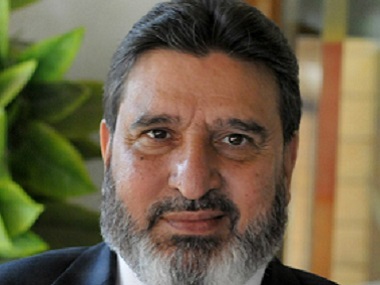The PDP, Congress, and National Conference (NC) on Wednesday confirmed an alliance in Jammu and Kashmir, ahead of the 19 December deadline to the Governor’s Rule in the state. According to reports, PDP’s Altaf Bukhari is the ‘consensus’ candidate for the post of chief minister. In order to checkmate efforts by the BJP to prop another government, the mainstream parties have been in touch with each other to form a government, according to reports. The plan envisages a coalition between PDP and Congress, which have been partners in a government between 2002 and 2007, backed from outside by the National Conference. The PDP has 28 MLAs, followed by NC with 15 and Congress with 12 which will make up for a clear majority. The alliance is being discussed with the aim of stemming BJP’s chances of forming the government in the state again.
NDTV reported that the talks to form an alliance are in the “advanced stage”. The three parties might meet Governor Satya Pal Malik on Thursday, to discuss the proposal, the report said. Sources said that the Congress party is expected to hold a high-level meeting in Delhi on Friday. [caption id=“attachment_5592051” align=“alignleft” width=“380”] File photo of PDP’s Altaf Bukhari. Facebook[/caption] Ghulam Nadi Azad, leader of Opposition in the Rajya Sabha, said, “I believe in my party members. By tomorrow afternoon everything will be sorted out. An alliance is being talked about in all states. BJP first made the government with PDP, and they worsened the condition of the state.” NC made it clear that they were
not interested in joining a coalition government but would not be averse to giving outside support to a PDP-Congress coalition. The coming together of traditionally bitter rivals, the PDP and the NC, would mark a significant realignment of political forces in the state. The NC had offered its support to the PDP after the 2014 Assembly polls but the latter ignored the offer and aligned with the BJP. Efforts have also been underway to form a government headed by Sajjad Lone’s People’s Conference, which has only two MLAs but which would be banking on support by the 25 MLAs of BJP. However, this combination would fall short of the required majority of 44 which is sought to be made by splitting the PDP which has been rocked by dissidence. After the BJP’s withdrawal from the coalition government with the PDP on 16 June, Lone is understood to have been approaching disgruntled PDP leaders for forming an alliance with the BJP, the sources said. Imran Ansari, former PDP minister, is among a few others who have been cosy with the Peoples Conference, which has also approached some of the MLAs for joining the alliance with the BJP. A former separatist leader, Lone had been successful in breaking away National Conference’s chief spokesman Junaid Muttu, who recently contested the urban local body elections and became the mayor of Srinagar. On Tuesday, one of the founding members of PDP,
Muzaffar Hussain Baig , the brain behind its ‘self-rule’ document, gave a veritable setback to the party by throwing his weight behind the BJP ally Lone’s idea of opening a new chapter in troubled politics of the state. With inputs from agencies
The PDP, Congress, and National Conference (NC) on Tuesday indicated the possibility of forming an alliance in Jammu and Kashmir, ahead of the 19 December deadline to the Governor’s rule in the state.
Advertisement
End of Article


)
)
)
)
)
)
)
)
)



